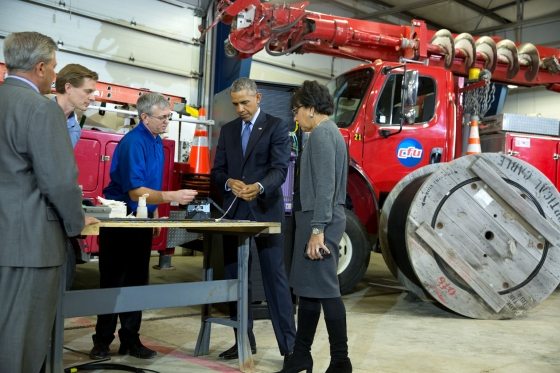
President Obama is vigorously–for a change–pushing two modifications in government policy for internet networks. One, changing the treatment of internet service to be more like the telephone service, is a complex issue with strong arguments on both sides. His second fight, the use of fiber distribution around the nation, is a clear advantage for citizens that likely isn’t going anywhere.
The President went out to little Cedar Fall, Iowa (pop. 39,000) on Jan. 14 for a speech on the need to make fiber available in cities. It seems like a reasonable enough idea, but it is fiercely opposed by the current internet service providers, cable TV services and phone companies. And the Republicans who control both the House and the Senate have already chosen an Iowa senator, the newly elected Joni Ernst, to respond to Obama’s comments on the subject in the State of the Union Jan. 20.
Obama called for federal regulation overruling 19 state laws that prohibit local governments from providing fiber service. “In too many places across America, some big companies are doing everything they can to keep out competitors,” the President said. “In some states it is virtually impossible to create networks like the one you have in Cedar Falls. Today I’m saying enough is enough, we’re going to change that.” The Federal Communications Commission plans to consider some state bans in February.
It’s less of an issue in big cities. Cable carriers such as Comcast, Time Warner Cable, Verizon FiOS, AT&T U-verse, and, in some places, Google, offer fast internet service. It may be expensive but the service is good. And where Google competes, it often drives down prices. And municipal service has turned out to be complex and pricey for big cities. By contrast, small towns are easier to provide for but have been offered little acceptable service by the existing carrier.
But it’s difficult to understand why small towns, which often are Republican (although Black Hawk County, which contains Cedar Falls, is slightly Democratic, perhaps the reason for Obama’s choice) want to stick with current services. Local business, whose owners tend to be overwhelmingly Republican, stand to gain considerably from better internet service that existing carriers seem unlikely to improve.
The reasons for the Republican opposition aren’t entirely clear. The Republicans were already opposed to increased regulation so why not this too? Republicans may have chosen to support cable and phone companies, which split their support. The GOP doesn’t like local government investment. Or perhaps, as is often the fact, Obama is for it so they are against.
The change in the new policy is following two courses. The White House is supporting legislation to bar the state from blocking fiber services, a measure that is unlikely to pass either the Republican House or Senate. And the FCC is considering banning prohibitions in North Carolina and Tennessee. If that passes, probably with the three Democratic votes of the commission, it would face being overturned by the Republican Congress.

Wonderful post! We will be linking to this great article on our site. Keep up the great writing